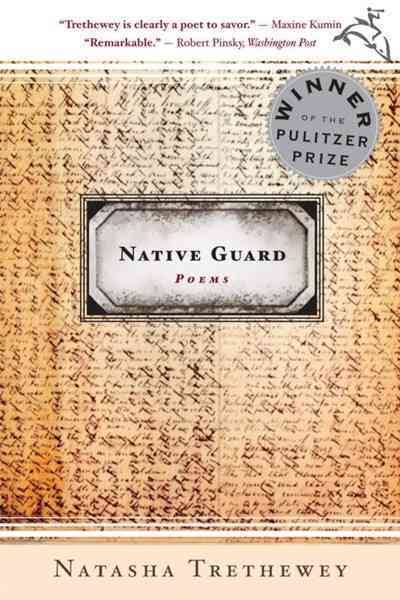Native Guard
Reviewed Apr 29, 2017 on The Litt Review.

Native Guard was a beautiful, small little book of poetry. I picked it up in a Goodwill shop in Somerville, Massachusetts, for a couple of dollars. That it was a winner of the Pulitzer Prize made me suspect it would be worth the buy - and, of course, it was. Natasha writes about the South - about her childhood there, about her mother, and about the Black regiments who fought for the Union during the Civil War. Almost all of the poems are infused with the concepts of race - what does it mean to be the daughter of a white man and a black woman in Mississippi, or what does it man to be a former slave and now not one.
Some of the pomes are especially poignant. Southern History, for example, where her history professor said that the slaves were happier before they were freed, and that Gone With The Wind was an accurate depiction of the antebellum South (it wasn’t, and they weren’t). She asks the question in the poem; does her silence, her unwillingness as a young student to raise her hand and state that the teacher’s perspective was wrong, make her complicit in the story? “A lie my teacher guarded. Silent, so did I.” she writes.
In another poem, Pastoral, she mentions being photographed with other black poets, mentioning that her father was white and rural.
Don’t you hate the South? they ask. You don’t hate it?
Why should see? It’s her home, too. I understand this question in another way. My mother is Southern - she comes nominally from Georgia, although she lived in North Carolina for the past decade or so, and bounced around the South as a child. She raised three children in Connecticut, as Yankees. Today, the only thing that admits I was born in South Carolina is my passport. (The fact that I have a Passport at all seems to belie that.) I may have a few words that are pronounced differently, a few Instagram photos of cousins in Charlotte and Ashville, and a penchant for white rice with butter and sugar, but I’m about as much a New Englander as they come. But I remember the pine trees weeping with pollen on our cars when I visited my grandparents. I remember long games of rummy on Southern afternoons. I remember my mother code-switching accents on the phone, and making fun of her for it. Do I hate the South? Can you hate a small part of you?
Trethewey’s best poems are the ones where she digs back into the past. The eponymous poem, Native Guard, is a long look at the Black regiments fighting for the Union, at a freed slave who knew how to write, which was more than most Confederate soldiers at the time. She plays a bit with the styles - one poem inverts itself halfway through, each line reading into the one below when that line was formerly the one above. In Native Guard, each line ends a stanza and begins the next. Sometimes, it’s overdone, but on the whole, the poems stick together beautifully, and you end up with a cohesive little book.
In Elegy for the Native Guards, she talks about how the sea has overtaken the old cemetery in the Ship Island fort. The Daughters of the Confederacy had put up a plaque to all of the white men who had died, but none for the Union soldiers who had. Where is their remembrance? It’s a question she asks repeatedly, often in the poems about her mother, like in the one where she tries not to rage against the ants drawing dirt from above her mother’s grave.
Believe me when I say
I’ve tried not to begrudge them
their industry, this reminder of what
I haven’t done. Even now,
the mount is a blister on my heart,
a red and humming swarm.
It is this which defines the book; poems as elegies, and elegies as healing. And just reading the poems themselves is a sort of healing, I found.
Do you want to get book reviews and notes from books I read in your inbox? Sign up! I'll include a summary, my favorite quotes from the book, and any vocabulary I found interesting or didn't know already.